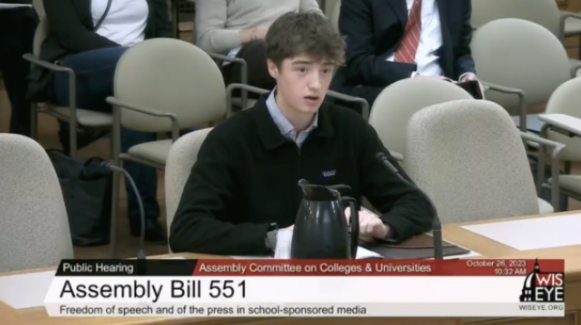Public Hearing on Oct. 26 for Assembly Bill 551. Photo from New Voices Wisconsin Instagram (@newvoiceswisconsin)
By Tia Bethke
On Oct. 23 Bill AB-551 was introduced to the Wisconsin state legislature by Sens. Cabral-Guevara, Tomcyzyk and Spreitzer. This bill’s creation is a culmination of efforts spearheaded by high school student journalist Simon Mehring. If the bill- now called SB-571– is passed in the Senate it would mean game-changing protections for Wisconsin student journalists.
Under the bill, public school student journalists from sixth grade through college would be afforded freedom of speech and the press in school-sponsored media. It prohibits the use of prior-restraint, meaning students would have full jurisdiction over what they publish without needing to get approval before publishing. It also prevents advisors from being disciplined for complying with the bill. This stands in stark contrast to policies held by numerous school districts in the state, including our own district.
The need for such legislation stems from the 1988 Hazelwood v. Kuhlmeier ruling, which determined that censorship in school-sponsored media does not violate students’ First Amendment rights, citing that if student speech does not comply with the educational mission of the school, the school has the right to limit it. Consequently, schools across the country have censored their student publications. This has prompted a push for legal protections for student journalists at the state level. Currently, 17 states have “New Voices” legislation, endorsed by the Student Press Law Center, safeguarding student press rights.
In 2014, Fond du Lac High School journalism students faced a new prior-restraint policy after publishing a story on sexual assault. The policy was quickly overturned as a result of support from the community and determined students. Matthew Smith, a journalism teacher and advisor at FHS saw firsthand how damaging it was to his students’ learning “to know that school officials may just demand changes or deletions out of nowhere.”
Smith made efforts to get a bill similar to SB-571 written and passed several years ago, however, there was not enough support for it and it died from inaction. He has been an advocate for SB-571 which has seen considerable success. The process was initiated by high school student Simon Mehring from Stoughton, Wisconsin, who heard about New Voices at a journalism conference last fall. He reached out to Wisconsin legislators and worked with the Student Press Law Center to draft and introduce the bill. Though he has never faced censorship, Mehring told The Cap Times, “The idea that just school boards can decide what student journalists can write about them, I don’t believe that is the most fair way.” He commented that the legislature wants to help solve the censorship problem, and “create a level playing field for all student journalists across the state.”

Simon Mehring testifying before Wisconsin’s Assembly Committee on Universities and Revenue. Photo from splc.org
Introduced on Oct. 23, the bill moved quickly through committee and was passed in the Assembly unanimously 98-0. The broad support for such a bill is astounding at a time when positions on media and education are often divided along party lines. The bill’s bipartisan sponsorship by Sens. Cabral-Guevara, R, Sen Tomcyzyk, R and Senator Spreizer, D, underscores the non-partisan nature of First Amendment rights. Proponents of the bill emphasize the values of free speech and unrestricted learning environments, as they are essential to the growth and learning of student journalists. However, concerns about the content that will be published by students remain relevant. Skeptics worry about maintaining editorial standards, accuracy and covering controversial and sensitive topics appropriately. Lawmakers will need to consider this if they are to establish legislation that promotes free expression and upholds ethical journalistic standards simultaneously.
At DDHS, the statutes established by the bill, if passed, would alleviate the need for administrators to review our content before publishing and would prevent censorship on subjective issues.
On Tuesday, Dec. 5 Senate Bill 571 will go to a public hearing, where citizens can lobby in support or opposition. From there the Senate Committee on Universities and Revenue will vote to determine if the bill will move on to the full Senate. Fond du Lac teacher Matthew Smith doesn’t want to get his hopes up but thinks the bill has serious potential to be passed in the Senate. It is an issue of “supporting learning and voices on all sides. Once that becomes obvious and accepted, these sorts of bills can really take off.”